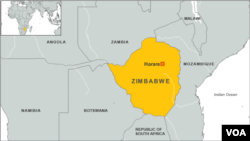HARARE, ZIMBABWE —
The United Nations has launched a worldwide appeal for humanitarian assistance to Zimbabwe. The U.N. acknowledged there already had been some improvements in Zimbabwe’s humanitarian situation.
Alain Noudehou, the United Nations humanitarian coordinator in Zimbabwe, launched the $131 million appeal on Tuesday. He said the fund would be aimed at addressing ongoing food shortages, waterborne disease outbreaks and issues affecting Zimbabweans deported from neighboring countries.
“We are appealing for $131 million this year," Noudehou said. "Approximately 80 percent of this year’s request will be devoted to food security.”
Zimbabwe was a net exporter of food to the region until its agro-based economy took a nosedive in the early 2000s.
This was after President Robert Mugabe’s government embarked on a chaotic land reform program displacing experienced white commercial farmers. They were replaced with black peasant farmers who had little -- if any -- knowledge of commercial farming, nor the money to provide needed irrigation.
Since then the country has been depending on food handouts to feed its people.
At the launch of the U.N. appeal Tuesday, a senior official in Zimbabwe's ministry of regional integration and international cooperation, Tedious Chifamba, said Harare was tackling its problems.
“Zimbabwe is neither a classic humanitarian case nor is it a failed state," Chifamba said. "There are more deserving cases out there which are competing with us which are indeed victims of extreme weather conditions… Or natural or manmade calamities such as volcanoes, earthquakes tsunamis, wars, etcetera.”
U.N. officials say this year's appeal is about $70 million less than last year's because of the steady improvement in the humanitarian situation in Zimbabwe brought about by recovery in some key sectors of the economy.
Alain Noudehou, the United Nations humanitarian coordinator in Zimbabwe, launched the $131 million appeal on Tuesday. He said the fund would be aimed at addressing ongoing food shortages, waterborne disease outbreaks and issues affecting Zimbabweans deported from neighboring countries.
“We are appealing for $131 million this year," Noudehou said. "Approximately 80 percent of this year’s request will be devoted to food security.”
Zimbabwe was a net exporter of food to the region until its agro-based economy took a nosedive in the early 2000s.
This was after President Robert Mugabe’s government embarked on a chaotic land reform program displacing experienced white commercial farmers. They were replaced with black peasant farmers who had little -- if any -- knowledge of commercial farming, nor the money to provide needed irrigation.
Since then the country has been depending on food handouts to feed its people.
At the launch of the U.N. appeal Tuesday, a senior official in Zimbabwe's ministry of regional integration and international cooperation, Tedious Chifamba, said Harare was tackling its problems.
“Zimbabwe is neither a classic humanitarian case nor is it a failed state," Chifamba said. "There are more deserving cases out there which are competing with us which are indeed victims of extreme weather conditions… Or natural or manmade calamities such as volcanoes, earthquakes tsunamis, wars, etcetera.”
U.N. officials say this year's appeal is about $70 million less than last year's because of the steady improvement in the humanitarian situation in Zimbabwe brought about by recovery in some key sectors of the economy.
